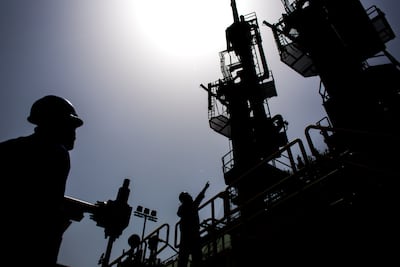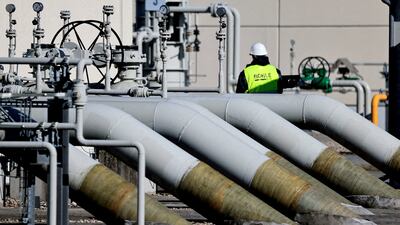Imagine that Karachi and Dhaka are each served by a single power plant. Germany demands for its own political reasons that the plants are turned off, spends heavily to enforce this, and both cities are plunged into darkness.
It sounds incredible — but current European policy has the same effect.
In the face of Russia’s floundering campaign in Ukraine, its near shutdown of gas supplies to Europe, impending bans on Russian oil, and September’s explosions on the Nord Stream pipelines, European capitals have elevated their security of supply above all. They rightly blame Moscow for denying food to poorer countries, but do not face up to the energy starvation their policies impose on others.
After much angst, Berlin finally decided to keep two of its three remaining nuclear power plants on standby — but not generating — until April. The country has fired up its mothballed coal power stations, and is building at least six terminals to import liquefied natural gas. Europe has bought and stored so much gas that, after prices hit all-time records in August, they are now at barely a quarter of that level.
Germany, the UK and others have announced enormous financial support packages to households to cope with their energy bills. Spain’s gas consumption for electricity almost doubled in October as it capped fuel prices. Meanwhile, efforts on energy efficiency and conservation have been mostly voluntary and weak.
In response, the LNG price has become simply unaffordable for South Asian countries. Or, when they are ready to pay, they find that the seller has diverted the cargo to Europe, realising higher profits that more than cover the modest contractual penalty for non-delivery. Pakistan issued a tender in August for LNG supplies from this December to December 2028 — and received no bids at all.
Last month, Bangladesh endured its worst power cut since 2014, when about 80 per cent of the country lost electricity. Pakistan has suffered endemic power cuts this year, worsening a political and economic crisis.
So how can lower-income countries in South Asia and Africa satisfy their own energy needs?
Can they outbid Europe for LNG? No, since the continent is richer, and will provide financial backing to make sure its citizens don’t go cold. Berlin is providing a €200 billion aid package, of which €31 billion will go to energy trader Uniper, nationalising it and making sure it can stand behind its supply contracts to German utilities.
Much global LNG supply is also sewn up by other wealthy countries in East Asia — Japan, South Korea and Taiwan — under long-term contracts. By the end of next year, Germany, the Netherlands, France, Italy and other European nations will have added 50 billion cubic metres of LNG import capacity, equivalent to a third of prior gas supplies from Russia, at a time that hardly any new LNG export plants are starting up.
Can they develop their own fossil fuel resources? No, because international financial institutions, banks and insurers have increasingly forbidden lending to oil, gas and coal projects, either at government insistence or because of their own “net-zero” policies. Developing countries are usually reliant on external financing for such ventures.
International oil companies, especially those in Europe, have restricted their new ventures to a handful of the most promising countries. The few projects that do progress are export-orientated, with creditworthy customers in Europe or East Asia, not focused on bringing energy to African or South Asian consumers.
What if developing countries build gas or coal-fuelled power or industry with carbon capture and storage to eliminate most emissions? Unfortunately, that runs into three problems. First, out of 197 CCS projects operational or in different stages of development worldwide in the Global CCS Institute’s latest report, only six are in middle-income Asian countries, and those are relatively wealthier ones — Malaysia, Thailand, Indonesia and Timor-Leste. There is not a single venture in India, Pakistan, Bangladesh or anywhere in Africa.
Secondly, such projects in developing countries would still fall foul of anti-fossil lending rules. Even if the plant itself qualified, the coal mine or gasfield that feeds it would not. Yet Pakistan has major undeveloped coalfields, as do southern African countries, while unused gas resources abound across Africa.
Thirdly, in Europe and the US, generous tax credits or carbon prices, amounting to $65-85 per tonne, encourage CCS. Developing countries do not have access to these, while international carbon offsets price at $20 per tonne at best, much too low to cover the cost of CCS projects, and usually don’t include CCS as eligible anyway.
So that leaves renewable energy. But despite abundant sun, wind and land, the Mena region accounts for just 3 per cent, and sub-Saharan Africa 2 per cent, of 2030 renewables targets. Clean energy investment in developing countries needs to step up from $150 billion in 2020 to more than $1 trillion in 2030. But as debate heats up at the Cop27 conference in Egypt, wealthy nations are still falling well short of their climate financing commitments.
Such policies are not just morally unjustified — they undermine Europe’s own critical environmental and energy security objectives. Countries that have nothing to do with Russia’s invasion of Ukraine, or the decade of European energy policy failures that preceded it, are made to bear the burden. This in turn damages attempts by Berlin, Brussels, London and Washington to build a diplomatic front.
To solve this, Europe needs to reflect on the wider impacts of its scramble for energy security. It should be pragmatic rather than rigidly ideological on fossil fuels, and create mechanisms to support carbon capture internationally. It could work with the existing programmes of Gulf states, notably the UAE and Saudi Arabia, for a massive scale-up of renewable energy in developing countries. Rather than turning others’ lights off, Europe will gain by illuminating them.
Robin M Mills is CEO of Qamar Energy, and author of 'The Myth of the Oil Crisis'
Arctic Monkeys
Tranquillity Base Hotel Casino (Domino)
Key facilities
- Olympic-size swimming pool with a split bulkhead for multi-use configurations, including water polo and 50m/25m training lanes
- Premier League-standard football pitch
- 400m Olympic running track
- NBA-spec basketball court with auditorium
- 600-seat auditorium
- Spaces for historical and cultural exploration
- An elevated football field that doubles as a helipad
- Specialist robotics and science laboratories
- AR and VR-enabled learning centres
- Disruption Lab and Research Centre for developing entrepreneurial skills
Porsche Macan T: The Specs
Engine: 2.0-litre 4-cyl turbo
Power: 265hp from 5,000-6,500rpm
Torque: 400Nm from 1,800-4,500rpm
Transmission: 7-speed dual-clutch auto
Speed: 0-100kph in 6.2sec
Top speed: 232kph
Fuel consumption: 10.7L/100km
On sale: May or June
Price: From Dh259,900
DC%20League%20of%20Super-Pets
%3Cp%3EDirector%3A%20Jared%20Stern%3C%2Fp%3E%0A%3Cp%3EStarring%3A%20Dwayne%20Johnson%2C%20Kevin%20Hart%2C%20John%20Krasinski%2C%20Keanu%20Reeves%2C%20Olivia%20Wilde%2C%20Kate%20McKinnon%2C%20Jameela%20Jamil%3C%2Fp%3E%0A%3Cp%3ERating%3A%203%2F5%3C%2Fp%3E%0A
Prop idols
Girls full-contact rugby may be in its infancy in the Middle East, but there are already a number of role models for players to look up to.
Sophie Shams (Dubai Exiles mini, England sevens international)
An Emirati student who is blazing a trail in rugby. She first learnt the game at Dubai Exiles and captained her JESS Primary school team. After going to study geophysics at university in the UK, she scored a sensational try in a cup final at Twickenham. She has played for England sevens, and is now contracted to top Premiership club Saracens.
----
Seren Gough-Walters (Sharjah Wanderers mini, Wales rugby league international)
Few players anywhere will have taken a more circuitous route to playing rugby on Sky Sports. Gough-Walters was born in Al Wasl Hospital in Dubai, raised in Sharjah, did not take up rugby seriously till she was 15, has a master’s in global governance and ethics, and once worked as an immigration officer at the British Embassy in Abu Dhabi. In the summer of 2021 she played for Wales against England in rugby league, in a match that was broadcast live on TV.
----
Erin King (Dubai Hurricanes mini, Ireland sevens international)
Aged five, Australia-born King went to Dubai Hurricanes training at The Sevens with her brothers. She immediately struck up a deep affection for rugby. She returned to the city at the end of last year to play at the Dubai Rugby Sevens in the colours of Ireland in the Women’s World Series tournament on Pitch 1.
DUNE%3A%20PART%20TWO
%3Cp%3E%3Cstrong%3EDirector%3A%3C%2Fstrong%3E%20Denis%20Villeneuve%3C%2Fp%3E%0A%3Cp%3E%3Cstrong%3EStarring%3A%3C%2Fstrong%3E%20Timothee%20Chamalet%2C%20Zendaya%2C%20Austin%20Butler%3C%2Fp%3E%0A%3Cp%3E%3Cstrong%3ERating%3A%3C%2Fstrong%3E%205%2F5%3C%2Fp%3E%0A
Fixtures and results:
Wed, Aug 29:
- Malaysia bt Hong Kong by 3 wickets
- Oman bt Nepal by 7 wickets
- UAE bt Singapore by 215 runs
Thu, Aug 30: UAE v Nepal; Hong Kong v Singapore; Malaysia v Oman
Sat, Sep 1: UAE v Hong Kong; Oman v Singapore; Malaysia v Nepal
Sun, Sep 2: Hong Kong v Oman; Malaysia v UAE; Nepal v Singapore
Tue, Sep 4: Malaysia v Singapore; UAE v Oman; Nepal v Hong Kong
Thu, Sep 6: Final
What sanctions would be reimposed?
Under ‘snapback’, measures imposed on Iran by the UN Security Council in six resolutions would be restored, including:
- An arms embargo
- A ban on uranium enrichment and reprocessing
- A ban on launches and other activities with ballistic missiles capable of delivering nuclear weapons, as well as ballistic missile technology transfer and technical assistance
- A targeted global asset freeze and travel ban on Iranian individuals and entities
- Authorisation for countries to inspect Iran Air Cargo and Islamic Republic of Iran Shipping Lines cargoes for banned goods
Living in...
This article is part of a guide on where to live in the UAE. Our reporters will profile some of the country’s most desirable districts, provide an estimate of rental prices and introduce you to some of the residents who call each area home.
New schools in Dubai
Company%20Profile
%3Cp%3E%3Cstrong%3EName%3A%3C%2Fstrong%3E%20Neo%20Mobility%3Cbr%3E%3Cstrong%3EStarted%3A%3C%2Fstrong%3E%20February%202023%3Cbr%3E%3Cstrong%3ECo-founders%3A%3C%2Fstrong%3E%20Abhishek%20Shah%20and%20Anish%20Garg%3Cbr%3E%3Cstrong%3EBased%3A%3C%2Fstrong%3E%20Dubai%3Cbr%3E%3Cstrong%3EIndustry%3A%3C%2Fstrong%3E%20Logistics%3Cbr%3E%3Cstrong%3EFunding%3A%3C%2Fstrong%3E%20%2410%20million%3Cbr%3E%3Cstrong%3EInvestors%3A%3C%2Fstrong%3E%20Delta%20Corp%2C%20Pyse%20Sustainability%20Fund%2C%20angel%20investors%3C%2Fp%3E%0A
Kill%20
%3Cp%3E%3Cstrong%3EDirector%3A%3C%2Fstrong%3E%20Nikhil%20Nagesh%20Bhat%3C%2Fp%3E%0A%3Cp%3E%3Cstrong%3EStarring%3C%2Fstrong%3E%3A%20Lakshya%2C%20Tanya%20Maniktala%2C%20Ashish%20Vidyarthi%2C%20Harsh%20Chhaya%2C%20Raghav%20Juyal%3C%2Fp%3E%0A%3Cp%3E%3Cstrong%3ERating%3A%3C%2Fstrong%3E%204.5%2F5%3Cbr%3E%3C%2Fp%3E%0A
Recent winners
2002 Giselle Khoury (Colombia)
2004 Nathalie Nasralla (France)
2005 Catherine Abboud (Oceania)
2007 Grace Bijjani (Mexico)
2008 Carina El-Keddissi (Brazil)
2009 Sara Mansour (Brazil)
2010 Daniella Rahme (Australia)
2011 Maria Farah (Canada)
2012 Cynthia Moukarzel (Kuwait)
2013 Layla Yarak (Australia)
2014 Lia Saad (UAE)
2015 Cynthia Farah (Australia)
2016 Yosmely Massaad (Venezuela)
2017 Dima Safi (Ivory Coast)
2018 Rachel Younan (Australia)
The five types of long-term residential visas
Obed Suhail of ServiceMarket, an online home services marketplace, outlines the five types of long-term residential visas:
Investors:
A 10-year residency visa can be obtained by investors who invest Dh10 million, out of which 60 per cent should not be in real estate. It can be a public investment through a deposit or in a business. Those who invest Dh5 million or more in property are eligible for a five-year residency visa. The invested amount should be completely owned by the investors, not loaned, and retained for at least three years.
Entrepreneurs:
A five-year multiple entry visa is available to entrepreneurs with a previous project worth Dh0.5m or those with the approval of an accredited business incubator in the UAE.
Specialists
Expats with specialised talents, including doctors, specialists, scientists, inventors, and creative individuals working in the field of culture and art are eligible for a 10-year visa, given that they have a valid employment contract in one of these fields in the country.
Outstanding students:
A five-year visa will be granted to outstanding students who have a grade of 95 per cent or higher in a secondary school, or those who graduate with a GPA of 3.75 from a university.
Retirees:
Expats who are at least 55 years old can obtain a five-year retirement visa if they invest Dh2m in property, have savings of Dh1m or more, or have a monthly income of at least Dh20,000.
More from Rashmee Roshan Lall
World Sevens Series standing after Dubai
1. South Africa
2. New Zealand
3. England
4. Fiji
5. Australia
6. Samoa
7. Kenya
8. Scotland
9. France
10. Spain
11. Argentina
12. Canada
13. Wales
14. Uganda
15. United States
16. Russia
Starring: Jamie Foxx, Angela Bassett, Tina Fey
Directed by: Pete Doctor
Rating: 4 stars








